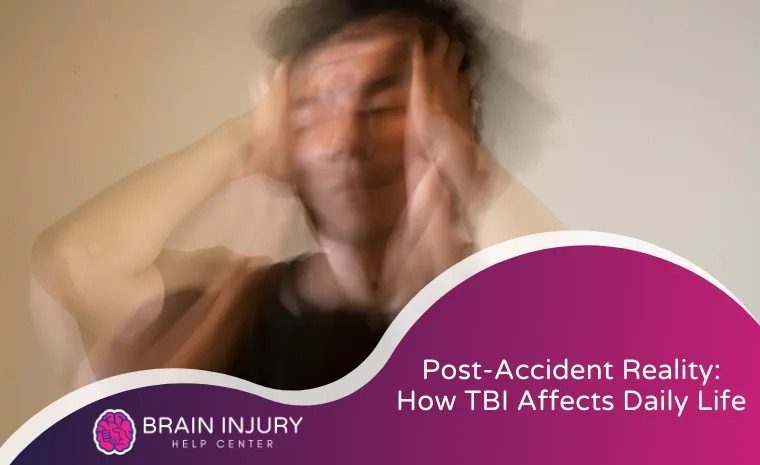Traumatic Brain Injury (TBI) is a serious and often life-changing condition resulting from an external force to the head. Commonly stemming from incidents like a car accident or a slip and fall, TBIs can have profound and lasting impacts on an individual’s daily life.
These injuries range in severity from mild concussions to severe brain damage and can lead to temporary or permanent impairment in cognitive, physical, and emotional functions. The prevalence of TBI is notably high in urban areas like Los Angeles, where dense traffic and active lifestyles increase the risk of accidents. Working with an accident lawyer in Los Angeles can be crucial for managing the legal and financial challenges that often accompany TBIs.
This blog will explore how TBI affects daily life and the legal and medical remedies to navigate this daunting injury.
How TBI Affects Daily Life
The impact of a TBI on daily life can be extensive and varied, depending on the severity of the injury and the areas of the brain affected. Both short-term and long-term consequences can emerge, disrupting everyday activities and overall quality of life. Here, we explore how TBI affects daily life, from cognitive functions to social interactions.
Short-Term Effects
In the immediate aftermath of a TBI, individuals may experience a range of symptoms, such as:
- Cognitive Impairments: Difficulty with memory, concentration, and attention. Tasks that require mental focus, such as reading or following conversations, become challenging.
- Physical Symptoms: Headaches, dizziness, fatigue, and sensory impairments (e.g., blurred vision, double vision, or sensitivity to light and noise). Physical coordination may also be temporarily affected, increasing the risk of further injury.
- Emotional and Behavioral Changes: Irritability, mood swings, anxiety, and depression are common. These emotional changes can strain relationships and affect an individual’s ability to engage in social activities.
Long-Term Effects
For many, the effects of brain injury extend beyond the initial recovery period, leading to chronic challenges:
- Learning and Cognition: Long-term cognitive impairments may persist, affecting problem-solving skills, decision-making abilities, and the capacity to process information. This can hinder educational pursuits and job performance, making it difficult to return to pre-injury levels of function.
- Mobility: Persistent physical difficulties can include issues with balance, coordination, and motor skills. Some individuals may require assistive devices like walkers or wheelchairs and ongoing physical therapy to manage these challenges.
- Emotional Regulation: Long-term emotional and behavioral changes can include chronic depression, anxiety disorders, and difficulties in controlling anger. These changes can lead to social withdrawal and isolation, further exacerbating the emotional toll of TBI.
- Social Interactions: Challenges in communication and social cognition can make it difficult to maintain relationships and engage in community activities. Individuals with TBI may struggle with understanding social cues, keeping up with conversations, and responding appropriately in social settings.

TBI Real Life Story
A resident of Cajon, California, endured a catastrophic car accident on December 2019. While commuting to work, another car suddenly struck her vehicle, resulting in a rollover. The severity of the accident was immense, causing her to fear for her life.
In the aftermath, she suffered multiple injuries, including a mild traumatic brain injury (TBI). This TBI has had a profound impact on her life, causing speech impairments, chronic headaches, and significantly hindering her daily activities.
Recognizing the gravity of her situation, she sought Farahi Law Firm legal assistance. The expert personal injury lawyers in the firm conducted a comprehensive investigation and meticulous case preparation. Additionally, they sent her to physical therapy and provided her with the best medical professionals that she needed.
After months of fighting and successfully assessing the client’s damages, they secured a settlement of $1,250,000 for her, providing her with the compensation and justice she deserved.
The Role of Medical and Legal Assistance
Traumatic Brain Injury (TBI) necessitates both comprehensive medical care and skilled legal assistance to manage its multifaceted impact on daily life.
Immediate and ongoing medical care is essential for TBI recovery. This involves emergency care to stabilize the patient, followed by rehabilitation strategies like physical, occupational, and speech therapy to regain lost functions and adapt to new limitations. Psychological support is crucial for managing emotional issues and behavioral changes, while regular neurological follow-ups ensure appropriate adjustments in treatment.
Legal assistance is equally important in the aftermath of a TBI. An experienced accident lawyer in Los Angeles can help with insurance claims, negotiate settlements, and secure compensation for medical expenses, lost wages, and pain and suffering. They manage the legal complexities, allowing patients and families to focus on recovery while advocating for their rights to ensure fair treatment.
Combining medical care with legal support helps individuals with TBI navigate recovery challenges and secure a more stable future.
Conclusion
TBI affects daily life and has significant challenges, from cognitive and physical impairments to emotional and social difficulties. Understanding these impacts is crucial for offering proper support and fostering greater public awareness. If you or a loved one is dealing with a TBI, reach out to the Brain Injury Help Center in California for resources and legal assistance in navigating this journey.









